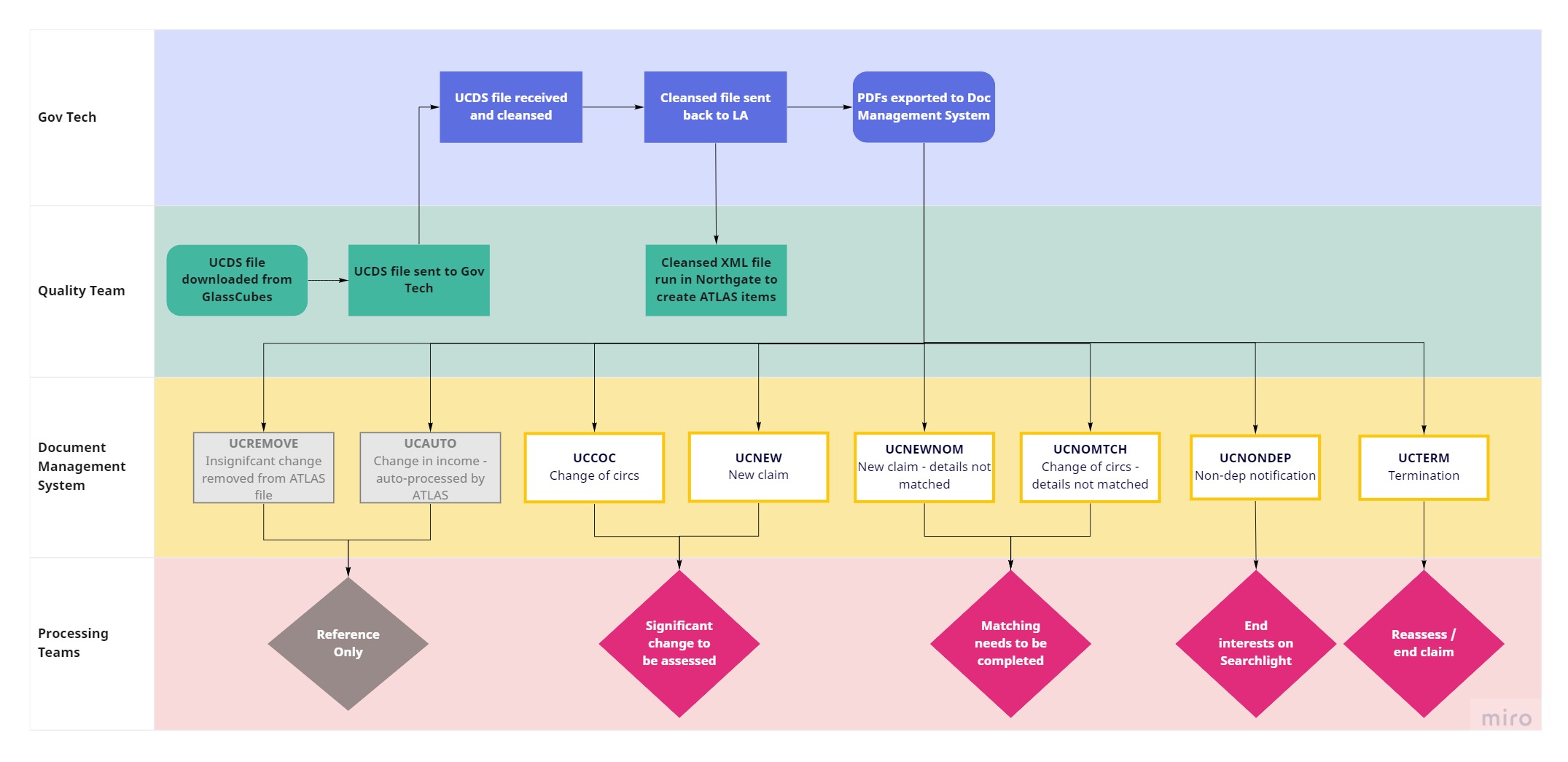After an extensive period of working with Govtech to test and enhance its Universal Credit Digital Service (“UCDS”) Kirklees MBC has deployed the UCDS to great...
Keeping up with the daily HBSTOP and LCTR workload, with Kirklees Council
With our thanks to Adele Nicholson and Alex Ewart, Project Officers at Kirklees Metropolitan Borough Council.
The recent publication of guidance for the new ‘Household Support Fund’, combined with the existing pressures on welfare and benefits teams, means that there has been no let up for councils as they continue to battle an increasing volume of daily HBSTOP and LCTR change notifications.
Effective income collection relies on councils making timely support decisions and processing changes quickly. Having to divert staff into dealing with HSF cases is just the latest example of how challenging it has become to juggle and manage constrained Assessor resources. But in councils like Kirklees and Sandwell, digital process automation has provided a sustainable means to manage both a rising tide of business-as-usual workload and the occasional large wave caused by yet another new initiative.
“When our new HSF application form went live, we received 1,600 applications overnight. We have since had to divert 28 staff into processing HSF applications. UC processing is also massive. It’s a good job UCDS means we don’t have to process these as I dread to think how many people we would need!”
Ian Dunn, Revenues & Benefits Service Manager, Sandwell MBC
"We’ve processed £125m worth of business grants so far; at one point, we had 85 staff answering the phones on this. But we’re still up to date with everything else."
Steve Bird, Head of Welfare & Exchequer, Kirklees Metropolitan Borough Council
Kirklees Metropolitan Borough Council is a long-standing Govtech customer, and the team maximises automation in all areas to provide an efficient, streamlined, and first-class service. Here the benefit assessors share their experience of using one of our digital process automation services, UCDS, to reduce the resources consumed in processing Universal Credit notifications from the DWP, automating around 50% of their daily caseload by filtering out things that are irrelevant, or insignificant.

Q: Firstly, could you please provide a high-level overview of your CTR scheme?
A: We have 3 schemes: Pensioner, Working Age and Universal Credit (UC) claimants. Focusing on our UC scheme, it includes:
- UC Max Award = Applicable Amount
- Ignore changes affecting CTR award by less than £2 per week – based on customer’s earned income changes
- Recalculation of CTR if claimant requests
Q: How were you managing the workload before UCDS?
A: We worked from PDFs in doc imaging system (Anite). When DWP stopped sending PDFs we set-up ATLAS to process certain items such as those for Personal Status to reduce unnecessary items in workload. Initially we ignored notifications that did not contain significant changes for 3 months and calculated the 4th notification.
As a manual process, each notification had to be looked at; processors were making decisions about whether to ignore changes in income that they deemed insignificant. This took time, resource and it also meant inconsistent decision making.
Q: What did you want UCDS to help you overcome?
A: Ignore insignificant changes!
We had to look at each notification to decide, which was time consuming, but we didn’t want to just calculate them all because of the knock-on effect this would have on Council Tax instalments and recalculations meaning that Direct Debits might not be collected. This was an inconsistent approach as it was down to the officer to decide on whether to calculate the change.
We wanted UCDS to ignore the changes for 3 months unless they contained significant changes. We calculated income thresholds which would change the CTR award by £2 per week and Govtech then used these to filter out the significant changes for us.
Q: Have you been able to automate as much as possible via Atlas?
A: Income is now updated and ended automatically on the significant changes. Claims that have both unearned and earned income have to be reviewed as ATLAS does not input a separate line of income for the ‘unearned income and benefits’ which affects entitlement on our scheme due the Max Award being used as the Applicable Amount.
Retrospective notifications are an issue in that we cannot automate them – Northgate sets them all to processed rather than in putting them in date order.
Other significant changes that we review are Self-employed claims (to check if minimum income floor has been used), zero UC award (because we input actual income so they can be calculated on our Working Age Scheme). We also manually review change in household, change of address and having the LCW added or removed – these are flagged for us as a work item in Anite.
Govtech highlight non-dep notifications so we can end the interests on Searchlight for these.
Q: How do you manage the workload now that you have UCDS?
A: We have different document types in Anite. The changes that are not significant come through as a reference document, as do the automated items and these require no work. For those requiring action, we work from PDFs in Anite and a report on Outstanding ATLAS items once we have completed all the PDFs for that batch date. This is necessary because sometimes things haven’t matched on Northgate that we expect to have automated.
Kirklees UCDS workflow

Q: How has UCDS made a difference?
A: At the very beginning, initially a reduction in workload from looking at 100% of the notifications to approx. 20% of these being removed as they were not significant.
Recent changes and automation mean around 50% are now either removed or automated which is allowing us time to catch up on the backlog.
We managed to automate most of the £20 uplift notifications!
We are always looking at ways to automate more, but retrospective notifications reduce our automation/removal rate because there are so many notifications for just 1 claim.
Sharing customer success
We’re fortunate to have knowledgeable and loyal customers who are only too willing to share their experience and expertise with their peers. If you would like to recap last month’s customer focus with Kirklees’ UCDS experience, then please get in touch and we’ll arrange that for you.
Just think, considering the current UC situation – will you be able to keep on top of your increasing daily HBSTOP and LCTR caseload?
UCDS could be the answer!As the volumes of UC notifications increase, processing and checking eligibility is time intensive; without automation it can easily overwhelm benefits departments. Our customers told us this was an escalating issue. So we listened, and developed UCDS to solve this problem. Be inspired by Kirklees MBC experience and choose automation as your solution. |
|



